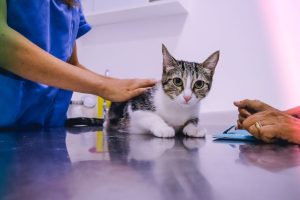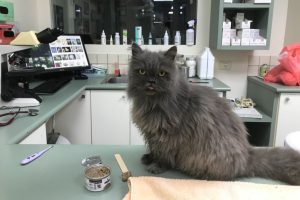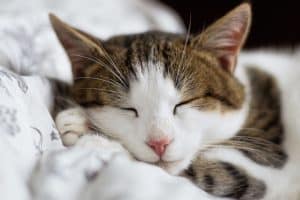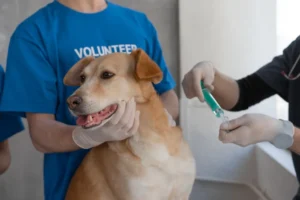Caring for a cat with special health concerns can sometimes feel like navigating a minefield.
You want to protect your furry friend from preventable diseases, but you’re also wary of the possible side effects vaccinations may have on their unique condition.
Striking the right balance can be a challenge, but armed with the right knowledge, you can make good decisions that prioritize your cat’s well-being.
I once faced a similar dilemma with one of my cats years ago, who had a weakened immune system due to feline leukemia. The journey taught me that there’s no one-size-fits-all approach, but with a little guidance, we can tailor a vaccination plan that suits our special feline companions.
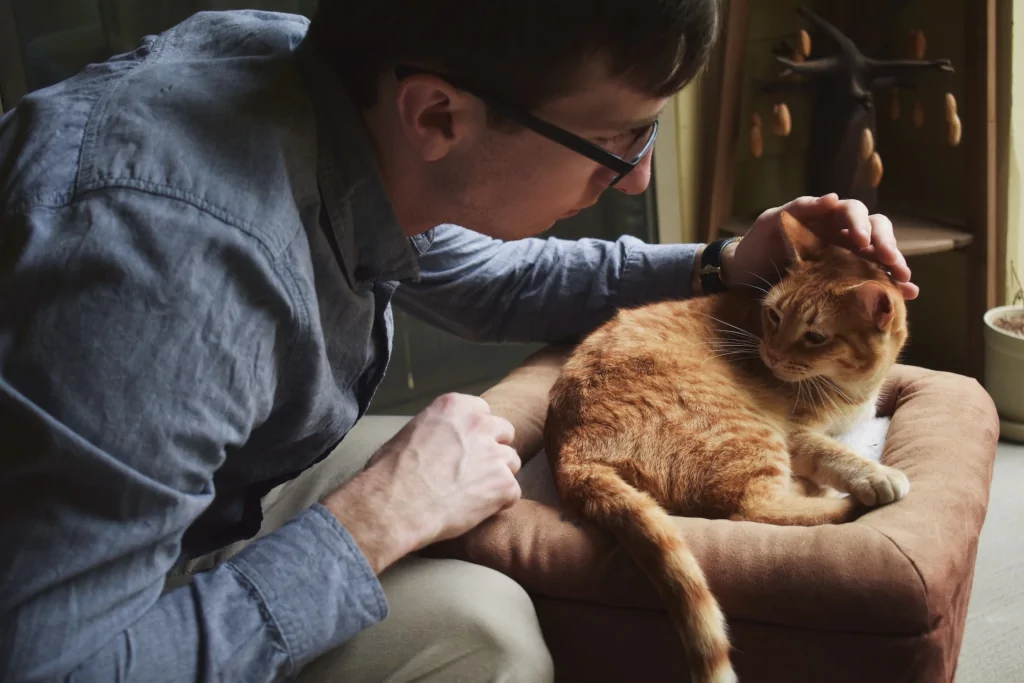
The Importance of Vaccination for Special Needs Cats
Vaccinations play a crucial role in protecting our cats from contagious and potentially life-threatening diseases.
For special needs cats, this protection is even more essential, as their health conditions can make them more susceptible to infections or complications.
Ensuring they receive appropriate immunizations is key to maintaining their overall health and quality of life. However, it’s important to approach vaccination with a tailored strategy that takes into account the unique circumstances of your cat’s condition.
In the following sections, we’ll delve deeper into specific situations and offer guidance for cats with allergies, immunosuppression, and chronic conditions.
Vaccinating Allergic Cats: What You Should Know
Navigating vaccinations for allergic cats can be challenging, but with the right information and guidance, you can ensure your feline friend stays healthy and protected. In this section, we’ll explore important factors to consider when vaccinating cats with allergies.
Recognizing Allergic Reactions
The first step in vaccinating allergic cats is understanding what an allergic reaction looks like. Symptoms may include facial swelling, vomiting, diarrhea, difficulty breathing, or excessive itching. Keep a close eye on your cat after vaccinations to spot any signs of a reaction.
Communicate with Your Vet
It’s essential to inform your vet about your cat’s known allergies or previous reactions to vaccines. This allows your vet to tailor a vaccination plan that takes into account your cat’s sensitivities.
Choosing the Right Vaccine
Some vaccines have a lower likelihood of causing an allergic reaction. For example, killed or recombinant vaccines are generally considered safer for allergic cats. Your vet can help you choose the best option for your feline friend.
Spacing Out Vaccinations
Administering one vaccine at a time and spacing them out by a few weeks can help reduce the likelihood of an allergic reaction. This approach also makes it easier to identify the specific vaccine causing the issue.
Pre-Treatment for Allergies
In some cases, your vet might recommend pre-treating your cat with antihistamines or steroids before administering a vaccine.
This can help reduce the risk of an allergic reaction. I remember giving my cat an antihistamine before vaccination, as per our vet’s advice, and it significantly reduced the severity of his reaction.
Monitoring Your Cat
After vaccination, monitor your cat closely for any signs of an allergic reaction. If you notice any symptoms, contact your vet immediately. Early intervention can make a significant difference in your cat’s recovery.
By following these guidelines and working closely with your vet, you can create a vaccination plan that keeps your allergic cat protected while minimizing potential risks.
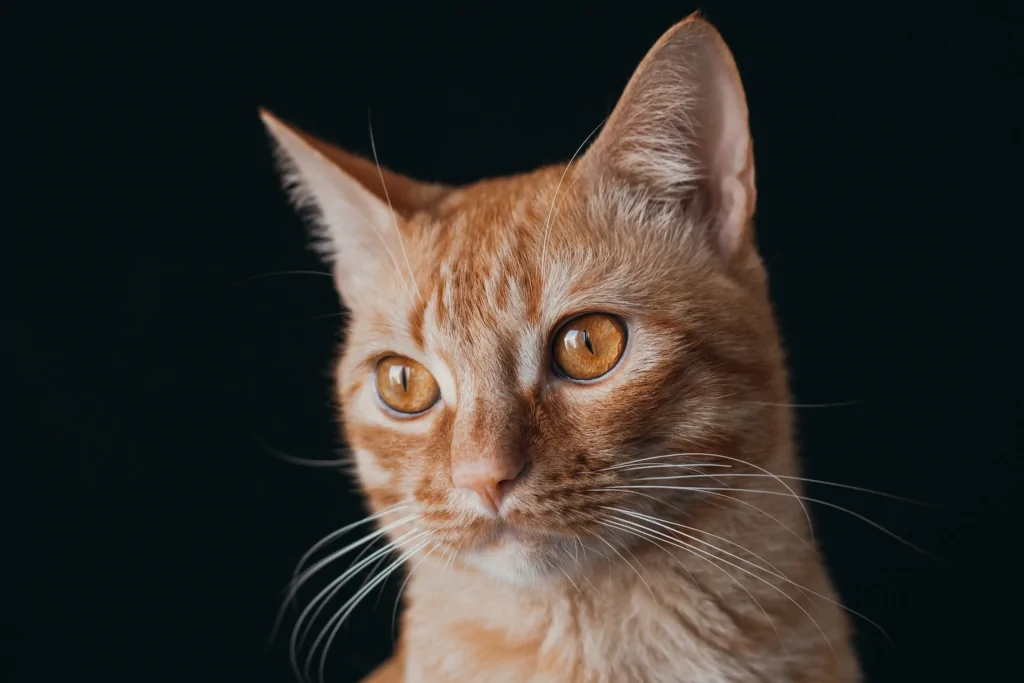
Immunizations for Immunosuppressed Cats: A Closer Look
Cats with weakened immune systems require special attention when it comes to immunizations. In this section, we’ll take a closer look at the factors to consider and the types of vaccines that may be suitable for immunosuppressed cats.
Understand Your Cat’s Immune System
Before vaccinating an immunosuppressed cat, it’s essential to understand the factors contributing to their weakened immune system.
This can include chronic illnesses, ongoing treatments like chemotherapy, or immune disorders like feline immunodeficiency virus (FIV) or feline leukemia virus (FeLV).
Consult with Your Vet
Discuss your cat’s immunosuppressed status with your vet, who can help you determine the best vaccination strategy. They may recommend additional tests, such as antibody titers, to assess your cat’s immune response to previous vaccinations and guide the decision-making process.
Modify the Vaccination Schedule
Your vet may suggest altering the vaccination schedule for an immunosuppressed cat. This could involve delaying certain vaccinations, administering them less frequently, or avoiding them altogether if the risks outweigh the benefits.
Opt for Inactivated Vaccines
In general, inactivated or killed vaccines are safer for immunosuppressed cats, as they don’t contain live viruses that could pose a risk to a weakened immune system. Your vet can help you choose the most appropriate vaccine type for your cat’s specific needs.
Monitor Your Cat’s Health
Keep a close eye on your cat’s overall health, both before and after vaccinations.
This will help you and your vet make informed decisions about whether to proceed with, delay, or skip certain vaccinations. Be prepared to act quickly if your cat shows any signs of illness or adverse reactions.
Provide Proper Nutrition and Care
Maintaining a healthy diet and lifestyle is crucial for cats with weakened immune systems, as many cat owners will testify to this.
Ensure your cat receives proper nutrition, stays on a regular schedule for check-ups, and follows any prescribed treatments. This will help bolster their immune system and improve their ability to tolerate vaccinations.
Vaccination Strategies for Cats with Chronic Conditions
Developing an effective vaccination strategy for cats with chronic conditions is essential for maintaining their overall health. In this section, we’ll discuss factors to consider and the importance of working closely with your vet to create a tailored vaccination plan.
Assess the Risks and Benefits
When considering vaccinations for cats with chronic conditions, it’s crucial to weigh the potential benefits against the risks. Discuss your cat’s specific health issues with your vet to determine the best course of action.
For example, if your cat has chronic kidney disease, your vet may prioritize vaccinations for respiratory infections, as these can exacerbate kidney problems.
On the other hand, if your cat suffers from diabetes, your vet may focus on preventing infections that could lead to fluctuations in blood sugar levels.
Prioritize Core Vaccines
Core vaccines are those recommended for all cats, regardless of their health status. Focus on administering these essential vaccinations, such as rabies and feline panleukopenia, while considering the unique needs of your cat’s chronic condition.
Be Mindful of Vaccination Frequency
Cats with chronic conditions may require a modified vaccination schedule, with vaccines administered less frequently than the standard guidelines. Collaborate with your vet to establish an appropriate schedule tailored to your cat’s needs.
Consider Alternative Vaccine Types
In some cases, your vet may recommend alternative vaccine types, such as recombinant or subunit vaccines, which can be safer for cats with chronic conditions.
These vaccines contain only specific components of the virus, reducing the risk of adverse reactions.
Support Your Cat’s Overall Health
Provide a balanced diet, plenty of fresh water, and a comfortable living environment to support your cat’s overall health. This will help improve their ability to tolerate vaccinations and reduce the risk of complications.
Try to implement these strategies and even educate yourself a bit more on what to do. Work with your vet, and you can help ensure your cat with a chronic condition receives the necessary protection from vaccinations while minimizing potential health risks.
If you haven’t chosen a vet yet, check out our easy-to-follow guide on how to choose the right vet.
How to Discuss Your Cat’s Needs with Your Vet
Establishing open communication with your vet is crucial for addressing your cat’s specific health concerns. Prepare a list of questions before the appointment, and don’t hesitate to share your observations and worries about your cat’s health.
I remember discussing my cat’s food allergies with the vet and mentioning a specific treat that caused a reaction. Armed with that information, the vet was able to recommend a hypoallergenic diet for my buddy.
Tips for Monitoring Your Cat’s Health After Vaccination
Keep an eye on your cat for any signs of discomfort or adverse reactions following vaccination. Regularly inspect the injection site for swelling or redness, and monitor your cat’s behavior, appetite, and energy levels.
Every time one of my cats received a vaccination, I made a point to check on them frequently and even set up a cozy spot for them to rest and recover.
To learn more about how to care for your feline friend, check out our guides on cat health and care.
FAQs
How often should I monitor my cat’s health post-vaccination?
Monitor your cat’s health closely for at least 24-48 hours after vaccination, as most adverse reactions occur within this time frame. However, continue to keep an eye on your cat’s well-being in the following days and weeks.
Are there alternatives to vaccinations for cats with special needs?
In some cases, alternative vaccine types like recombinant or subunit vaccines may be recommended for cats with special needs. Consult with your vet to explore the available options and determine the best approach for your cat.
Can I vaccinate a pregnant cat with special health concerns?
While vaccinating a pregnant cat is fine if no health issues, any kind of special health concerns should be carefully considered on a case-by-case basis. Consult with your vet to evaluate the risks and benefits of vaccinating your pregnant cat, taking into account her specific health issues.
Are there any specific vaccinations to avoid for special needs cats?
The necessity of specific vaccinations for special needs cats depends on the individual cat’s health concerns. Always consult with your vet to determine which vaccinations are appropriate for your cat’s unique situation.
Alex, a passionate animal lover, has experience in training and understanding animal behavior. As a proud pet parent to two dogs and three cats, he founded AnimalReport.net to share insights from animal experts and expand his knowledge of the animal kingdom.

